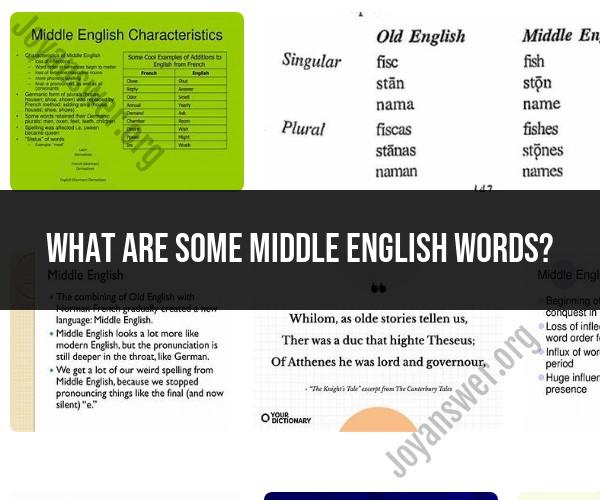What are some Middle English words?
Middle English was spoken and written in England from approximately the 12th to the late 15th century. During this time, the English language underwent significant changes in vocabulary, pronunciation, and grammar as it transitioned from Old English to Early Modern English. Middle English words may appear quite different from their modern counterparts. Here are some examples of Middle English words along with their modern English equivalents:
"Thou" (Middle English) vs. "You" (Modern English): In Middle English, "thou" was the informal singular form of "you" used when addressing a single person informally. "You" eventually became the standard form for both singular and plural, and "thou" fell out of common use.
"Art" (Middle English) vs. "Are" (Modern English): In Middle English, "art" was the second person singular form of the verb "to be." For example, "Thou art" meant "You are."
"Mote" (Middle English) vs. "Must" (Modern English): "Mote" was used in Middle English to express necessity or obligation. It is related to the modern English "must."
"Wif" (Middle English) vs. "Wife" (Modern English): "Wif" in Middle English meant "woman" or "wife." It is the predecessor of the modern English word "wife."
"Knyght" (Middle English) vs. "Knight" (Modern English): In Middle English, "knyght" referred to a mounted and armored soldier. The modern spelling "knight" is still used.
"Bote" (Middle English) vs. "Boat" (Modern English): "Bote" in Middle English meant a small vessel or boat, which is similar in meaning to the modern English word "boat."
"Swete" (Middle English) vs. "Sweet" (Modern English): "Swete" in Middle English meant "sweet" or "pleasant," and it is the precursor to the modern English word "sweet."
"Doughter" (Middle English) vs. "Daughter" (Modern English): "Doughter" in Middle English referred to a female child, which evolved into the modern English word "daughter."
"Hous" (Middle English) vs. "House" (Modern English): "Hous" in Middle English meant "house" or "dwelling." The modern spelling "house" is still in use today.
"Sonne" (Middle English) vs. "Son" (Modern English): "Sonne" in Middle English referred to a male child, which is similar to the modern English word "son."
These examples illustrate how the English language has evolved over time, with Middle English being an intermediate stage in its development. Many Middle English words are recognizable in modern English, but their spellings and pronunciations have often changed significantly.
1. Appealing a Medicaid Decision in Michigan: Steps and Guidance
If you have received a denial or adverse decision from the Michigan Department of Health and Human Services (MDHHS) regarding your Medicaid application or benefits, you have the right to appeal the decision. The appeal process is complex and can be daunting, but there are resources available to help you navigate the process.
Here is a step-by-step guide to appealing a Medicaid decision in Michigan:
- Request a fair hearing. You must request a fair hearing within 11 days of the date you receive the denial or adverse decision from MDHHS. You can request a fair hearing by writing to the MDHHS Office of Administrative Hearings and Rules (MAHR) or by calling MAHR at 1-877-833-0870.
- Prepare for your hearing. Once you have requested a fair hearing, you will receive a notice of hearing from MAHR. This notice will include the date, time, and location of your hearing. You should use this time to gather evidence to support your appeal. This evidence may include medical records, income and asset statements, and letters from doctors or other healthcare providers.
- Attend your hearing. At your hearing, you will have the opportunity to present your case to a hearing officer. The hearing officer will also hear testimony from MDHHS representatives. You can bring a witness with you to your hearing, and you can also have an attorney represent you.
- Receive a decision. After the hearing, the hearing officer will issue a written decision. The decision will either uphold the MDHHS denial or adverse decision, or it will overturn the decision and award you Medicaid benefits.
If you are not satisfied with the hearing officer's decision, you can appeal the decision to the Michigan Court of Claims.
2. Advocating for Your Benefits: How to Appeal a Medicaid Decision in MI
Here are some tips for advocating for your benefits during the Medicaid appeal process:
- Be organized and prepared. Gather all of your evidence and have it ready to present at your hearing.
- Be clear and concise in your testimony. State your case clearly and concisely, and be sure to address all of the issues that were raised in the MDHHS denial or adverse decision.
- Be respectful. Treat the hearing officer and MDHHS representatives with respect.
- Be persistent. If you are not satisfied with the hearing officer's decision, you can appeal the decision to the Michigan Court of Claims.
3. Navigating the Medicaid Maze: Tips for Successfully Appealing Decisions
Here are some additional tips for successfully appealing a Medicaid decision in Michigan:
- Contact a Medicaid advocate. A Medicaid advocate can help you understand the appeal process and can represent you at your hearing. You can find a Medicaid advocate through your state Medicaid agency or through a local nonprofit organization.
- Use the Medicaid.gov website. The Medicaid.gov website provides a wealth of information about the Medicaid appeal process. You can find information about how to request a fair hearing, how to prepare for your hearing, and how to appeal the hearing officer's decision.
- Contact your state Medicaid agency. Your state Medicaid agency can provide you with specific information about the Medicaid appeal process in your state. You can find contact information for your state Medicaid agency on the Medicaid.gov website.











